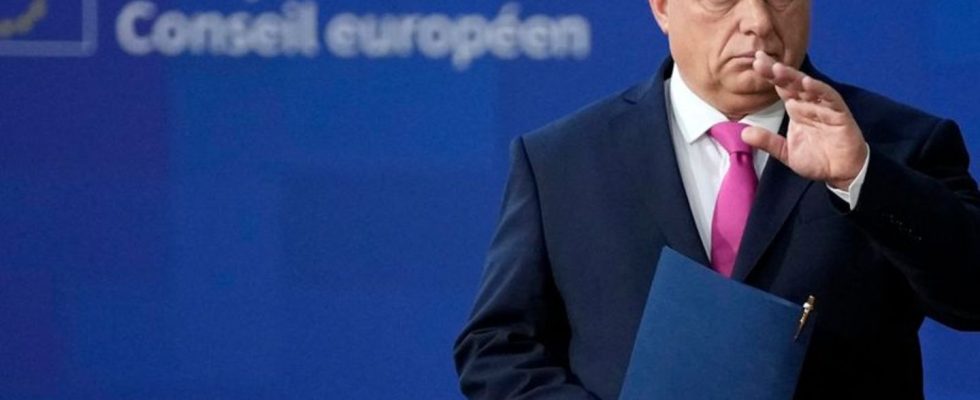Conflicts
EU summit: Scholz pushes for agreement on aid to Ukraine
Hungarian Prime Minister Viktor Orban rejects billions in financial aid for Ukraine. photo
© Virginia Mayo/AP/dpa
Does Hungary’s Prime Minister Viktor Orban risk a major break with the EU? This question arises before the special EU summit this Thursday. There is also a lot at stake for Ukraine.
Will there be a break with unforeseeable consequences? Or is there still a compromise? At a A final attempt will be made at a special EU summit in Brussels to persuade Hungarian Prime Minister Viktor Orban to agree to plans for new aid to Ukraine.
Before the special EU summit, Chancellor Olaf Scholz is pushing for a joint decision from all 27 member states, including Hungary, which has so far blocked an agreement. “My firm belief is that this should actually be possible if Europe sees itself as a community in which everyone stands up for each other and helps each other,” said Scholz before the start of the consultations in Brussels.
The package with financial support commitments amounting to 50 billion euros for the period until the end of 2027 should actually have been decided at a regular EU summit last December. At that time, however, Orban vetoed it and thereby prevented an agreement.
The Hungarian had previously questioned the usefulness of the plans several times and in this context also pointed out that, in his view, the EU had wrongly frozen funds from the Community budget intended for his country.
EU diplomats accuse Orban of blackmail
Before the summit, Orban said in an interview with the French magazine “Le Point” that Hungary was ready to be part of a solution. However, the prerequisite is that you decide every year whether you want to continue sending money or not.
However, other member states such as Germany reject this. One reason is that they want to assure Ukraine of long-term support. It is also about depriving Hungary of opportunities for blackmail. EU diplomats accuse Orban of trying to use a veto policy to free EU funds that have been frozen due to concerns about the rule of law.
Orban rejects this. He also refers to the European elections coming up in June. In his opinion, committing 50 billion euros to Ukraine now for the period until the end of 2027 could give citizens the impression that their vote doesn’t matter, he argues with regard to critics of aid to Ukraine.
Possible steps to withdraw Hungary’s voting rights
If no solution is found in the talks with Orban, the other EU states want to act in a circle of 26 – i.e. without Hungary. At the same time, it is likely that there would then be discussions about possible steps to withdraw Hungary’s right to vote in EU decisions.
The necessary Article 7 procedure due to alleged deficiencies in the rule of law has been running for years. However, it has not yet been pushed forward with any commitment – partly in the hope that Orban will give in on controversial issues.
There was no information that night about discussions at a dinner organized by EU Council President Charles Michel before the special summit. According to information from the German Press Agency, Chancellor Olaf Scholz (SPD), among others, took part. Orban was filmed in Brussels that evening on the sidelines of a protest by farmers against EU agricultural policy. He said in a video posted on the Internet platform X that the concerns of people on the streets were not being taken seriously. New political leaders are needed.
Other topics at the special EU summit will be the Middle East conflict and EU military aid to Ukraine. Chancellor Scholz recently initiated a debate about military aid. He criticizes the fact that other large EU countries have budgeted significantly less money for arms and ammunition deliveries for the current year than Germany. In his opinion, this endangers Ukraine’s endurance in the defensive war against Russia.
Scholz criticizes arms deliveries from other countries
According to EU foreign policy chief Josep Borrell, Ukraine can hope for European military aid worth at least 21 billion euros this year. Compared to what has been provided so far, this would mean an acceleration of support, the Spaniard said on Wednesday after an informal meeting of EU defense ministers in Brussels. In the past two years since the start of the Russian war of aggression, the value of European military aid to Ukraine has totaled around 28 billion euros. They include weapons, ammunition and other military equipment.
Borrell also emphasized that the figure of 21 billion euros for 2024 was not based on feedback from all 27 EU member states. It could therefore continue to rise. Borrell did not say which EU countries have not yet reported any data. The collection of figures should also be the basis for the discussion suggested by Scholz at the special EU summit.
According to its own information, the federal government has budgeted around 7.5 billion euros for arms deliveries to Ukraine in 2024. In purely mathematical terms, this corresponds to a share of more than a third of the EU aid reported so far.

